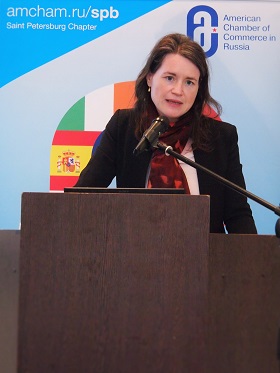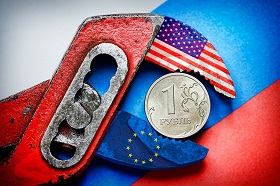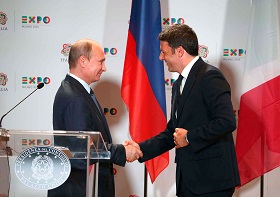Russia is passing through difficult times and its growth potential is looming. The World Bank expects its GDP to contract by 3.8 percent in 2015 and 0.3 percent in 2016, but swings in oil price will ultimately determine the outcome. In this context, the presence of economic sanctions contributes to worsening the situation.
Russia is passing through difficult times and its growth potential is looming. The World Bank expects its GDP to contract by 3.8 percent in 2015 and 0.3 percent in 2016, but swings in oil price will ultimately determine the outcome. In this context, the presence of economic sanctions contributes to worsening the situation.
A recently released study by the International Monetary Fund (IMF) suggests that “sanctions (and counter sanctions) could initially reduce Russia’s real GDP by 1 to 1-1/2 percent”. Yet, their effective impact on the economy and through which mechanisms sanctions will be enacted is not clear to most.
In order to cast some light on this topic, I have interviewed Birgit Hansl, Chief Economist at the World Bank for Russia and CIS countries. She also contributes to clarify some related issues and provides an accurate overview of how sanctions could impact Russia’s economic growth in the long run.
Dr. Hansl, what has been the most serious effects of sanctions, and financial sanctions especially, on Russian banks and financial system overall?
Well, if we look at the first impact of sanctions, the direct restriction to access international financial markets has certainly been the most serious one for some selected financial institutions. Yet, if we consider the impact on the financial system overall, we can say that there is just less capital; if you prevent key banks from accessing vital external sources of capital, the overall system must rely more on domestic capital and eventually on alternative foreign sources with all the consequences that entails.
In this context, some articles have argued that despite these negative consequences, the Central Bank has had a chance to clean up the system from unhealthy financial institutions. Do you confirm this?
Not really. The Central Bank’s policy of stronger supervisory controls came into effect one year before the geopolitical tensions started; therefore, I do not see any direct connection with sanctions specifically.
Due to the slump in oil price it is really difficult to assess the impact of sanctions on the exchange rate. Yet, do you think they have impacted the ruble?
Yes, of course. The main channel through which sanctions have impacted the ruble is the uncertainty they have created. High uncertainty caused by geopolitical tensions automatically increases the risk premium for a country’s investment and the cost of capital it wants to borrow abroad. Thus it has an effect on the interest rates charged to Russian external financing, which is also illustrated through the increase in the spread of sovereign credit default swaps, which hiked immediately in Russia when the geopolitical tensions started.
Moreover and more importantly, uncertainty generated by sanctions and international tensions triggered massive capital outflows, which dramatically impacted Russia’s external balances and the ruble exchange rate itself, of course.
Moving on to the effects of financial sanctions on firms, what have been the most serious drawbacks of being part of a sanctioned environment?
Overall, the effects on the non-financial sector have been the same as for banks; sanctioned firms experienced a restriction in access to Western capital markets, while others found capital simply more expensive because of the increase in the risk premium we referred to above. In addition, the ruble depreciation forced the Central Bank to hike its key rate policy, especially at the end of 2014 due to the oil price decline, which made domestic borrowing far more expensive.
Despite the interest rates coming down quite significantly since then, the monetary easing cycle did stop in September when the Central Bank stopped lowering its key policy rate due to the remaining high inflation pressure. This has contributed to a continued squeeze in the access to capital for firms and is hampering their investment plans.
In this context, has the risky environment created by sanctions somehow caused banks to be more cautious in regards to lending? And how important is it for the Central Bank to maintain a well functioning interest rate pass-through?
This is a really good question. What is worrying indeed is not the current level of interest rates but the banks’ higher level of risk aversion. If you look at the international experience during and after the global financial crisis of 2008, one of the most dramatic consequences was the general fear of banks to lend, which slowed credit growth even when interest rates were low.
In Russia, a similar scenario is emerging and while there is no serious liquidity problem, banks appear to be much more cautious in providing credit to firms. The result is low credit growth that negatively impacts the ability of firms to raise and invest capital. In this sense the interest rate pass-through effect of monetary policy easing is functioning less well.
Despite of the negative outcomes brought by sanctions, it seems that Russian firms are decreasing their foreign debt stock consistently. Do you think this is a positive trend?
The fact that foreign debt stock of Russian firms and banks is decreasing is quite natural, both because several banks and firms cannot roll external debt over and are forced to pay it off, and because debt becomes more expensive due to increased risk premium. In itself this trend is neither positive nor negative, but the bottom line is that the sanctioned environment limits the firms and banks’ options to raise capital and with that restricts their ability to invest.
To replace Western capital, Russia is entering Asian markets. Yet, the impression is that they are not so willing to provide such credit. To which extent is this statement true?
Well, surely some capital, especially from China, has entered but, as you point out, is not clear whether there will be a positive or negative net effect. Perhaps this is just a replacement of other capital, not an increase or decrease. More generally, it is very difficult for Russian firms to raise funds in Asia because Russia’s country risk is too high, no matter from which angle you look at it. Asian investors, as all other investors, take into account geopolitical tensions and sanctions. This is just an economic reality.
Moreover, Asian markets are used to investing in very high growth or potentially fast-growing economies. Russia, as you know, presently has low growth potential. Perhaps there are some sectors in which Asian capital is willing to flow in, such as the natural resource sector, but overall it remains quite difficult for Russia to attract capital from Asia.
Could Russia eventually utilize its interior sources of capital more efficiently to overcome some of its difficulties? I have read on the WB report, for example, that the National Welfare Fund (NWF) and the Russian Direct Investment Fund (RDIF) have extensive sources at their disposal that have not been invested at all.
Russia, as a natural resources exporting country, is by many accounts unlikely to become a completely cash strapped country; it will always generate revenues from natural resources and thus have capital. The real issue is that; foreign capital is often regarded as being of a different quality. FDI inflows are fundamental not only for the capital they bring into a country, but for the innovation content they attached to them in terms of new technology and management practices which might significantly improve productivity. This is the real positive spillover effect of FDI and why countries across the globe, even high-income countries, seek FDI: to allow for such an exchange of ideas and different ways of production, which is not happening with only domestic capital sources.
To conclude, according to the World Bank economic report published in April 2015, the negative effects of sanctions are likely to last long after their eventual lift. What are the reasons for this?
Well, several factors contribute to that. International investors might feel hesitant to come back. Also, reestablishing long standing cooperation and trusted relationships between firms and banks is not an easy process and takes time. In addition, the exclusion of Russian firms and banks from raising capital at international markets might cause Russian firms to be less focused on adhering to international corporate governance practices, which makes it again less likely for investors to come back quickly.
Last but not least, if you cannot access foreign capital for a long time, growth perspectives deteriorate because of the loss of its innovation and technology component. Therefore, even if such effects are not visible in the short term, they do have an impact on long-term growth. In this sense, the effects of sanctions last longer than the sanctions themselves.
Interviewed by Enrico Cattabiani, RIAC intern






